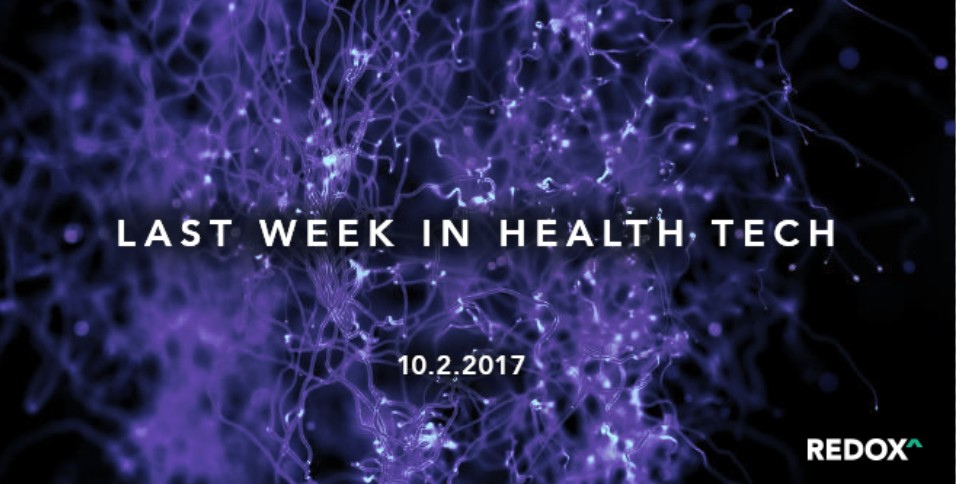Last week in health tech: October 2nd, 2017
Oct 09, 2017

Hello again, and welcome to our roundup of news items about healthcare technology.
First time readers, please note: this post refers to last week’s news (we are not prophets; we are content providers). This is news that we are keeping up with so that you can get a weekly digest just by visiting this blog or, even more efficiently, signing up for the Redox mailing list after you’re done reading. There's a lot to cover this week, so on to the content!
Let’s take a look at what happened the week of October 2, 2017.
Last week, saw three items dominate the news cycle, the first of which you may recognize: the blockchain. That is, there are yet more companies getting interested in, and doing risking assessments of, the blockchain (if the word and concept is unfamiliar, follow the link to an article that explains it very well for both the lay and more tech-savvy reader). Only time will tell whether these assessments turn out to be accurate, but we can say with certainty that the exploration of new technologies is a good thing for patients and providers alike, especially those that enable widespread interoperability.
In our previous LWIHT installment, we mentioned Dr. Raj Panjabi and Last Mile Health’s involvement in Liberia (“How Technology Can Create Good Jobs While Giving Health Care to the World's Poor”). On a related but slightly-more-geographically-specific note, Computer Weekly highlighted some of the ways in which healthcare technology has helped those in the Middle East. The so-called “digital health philosopher” John Nosta has quite a bit to say about it in the article, noting, “one of the most important takeaways is that we are at a fundamental inflection point in human history. Technology is changing the way we manage disease and manage health and wellness.” How health tech can aid those in underserved areas continues to be a very interesting discussion, and this article is well worth the read.
The third dominant trend in the news cycle involves the idea of a “value-based” healthcare system (which is what we at Redox are working to make a reality). This was reported on directly by more than one source, but was also at the heart of many healthcare articles not related to technology directly. One of the major points of interest, however, about a value-based healthcare system (aside from the radical idea of actually putting the patient first), is that interoperability is an absolutely essential part of it, as this article notes in its very first bullet point.
In other news, the MATTER and Sheba Medical Center have recently partnered. MATTER is a healthcare incubator and the Sheba Medical Center is the “leading innovation center in Israel”, so this partnership is quite unique: with MATTER’s innovation and SMC’s resources, the two seem like a fit that just might end up profiting us all. The partnership was made official in Chicago, where we already reported that Mayor Rahm Immanuel is looking to make the city a new center for healthcare technology. “I look forward to seeing what this partnership between two innovative organizations produces to benefit people throughout the world,” said Emanuel.
Meanwhile, the Digital Journal heralded the “Concierge Key Health” app as the “Uber of healthcare”, affording patients a way to “expedite the process of connecting to and consulting with elite top-tier doctors across the healthcare spectrum.” However, the app’s selling point (that it is a subscription-based service) may prove a barrier to those who could otherwise benefit from this technology. The article has more, including an interview with CKH’s founder, Robert Grant.
Despite the currently sunny skies of healthcare technology, there is one bit of darkness on the horizon, as one scholarly publication wonders whether the human race will be able to even feed itself come 2025. Let’s hope for everyone’s sake that some of the other advances we are making as a species (like the Dutch hyper-farming efforts recently well-profiled in National Geographic) can prove Mr. Swaminathan wrong.
Late in the week, we learned that the upcoming Diabetes Professional Care Conference (DPC2017) will be heavily favoring discussion of healthcare technology. While there is new technology to help those afflicted, it is important to note—especially with Type 2 diabetes—that technology, in this context, can be enormously helpful in preventative care, as illustrated by Professor Mike Trennell’s comment that “digital technology allows us to connect and educate one another in a way we could only have dreamed of just a few years ago.”
One must also give a nod to those extending healthcare technology beyond just helping people, but the world at large, such as the drones being used to help track wildlife in places where other tools are too frail, costly, or otherwise difficult to use—in this case, the arctic. The article goes on to detail another project whose purpose is to catch and analyze the water coming out of a whale’s blowhole!
That's is for this week. Till next time, happy reading!
